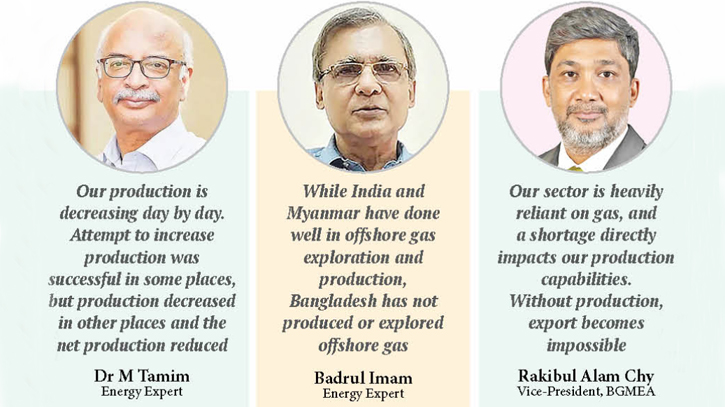
Photo : Messenger
Country’s commercial capital Chattogram has been facing total gas shutdown since Thursday midnight amidst prolonged gas crisis, which is affecting the whole country. From homes to factories, restaurants, hotels, and filling stations, the port city now grapples with an enduring gas shortage – thereby causing widespread sufferings.
On Friday, a significant number of households found themselves without stoves. While most commercial factories were relatively unaffected due to weekend closures, operational factories bore the brunt of the crisis.
Thousands of drivers found themselves stranded with their vehicles, waiting for gas in front of various filling stations since Thursday night. Following a sleepless night, many opted to leave their cars at the filling stations, returning home in the morning.
Long queues were also observed in front of various hotels and food shops throughout the city. In addition to affecting cooking gas, the shortage in liquefied natural gas (LNG) is also impacting compressed natural gas (CNG), industries, and power plants – thereby resulting in an overall acute gas crisis in the country.
Experts and analysts attribute the current gas crisis to a decline in domestic energy production and an increased reliance on imports. The country's highest demand for gas is as a primary fuel. Petrobangla's forecast shows a total demand of 3,715 million cubic feet of gas in the financial year 2023-24, encompassing seven sectors including power, industry, fertiliser, household, and CNG.
According to Petrobangla, there is currently a shortage of more than 1000 million cubic feet of gas. Experts believe that the gas shortfall is more - as much as 1.5 thousand million cubic feet.
Energy expert Prof M Tamim told The Daily Messenger, “Our production is decreasing day by day. An attempt was made to increase production. It increased production in some places but decreased in other places and reduced the net production. We also see a stagnation in imports.”
Karnaphuli Gas Distribution Company Limited (KGDCL), responsible for supplying gas to approximately 600,000 customers in Chattogram, has abruptly halted gas supply without providing any notice or prior announcement to its customers. While KGDCL authorities claim that the crisis is unforeseen, customers are left without any information or contingency plans.
The majority of the country's gas demand, including Chattogram, relies on imports. The gases imported to the Chattogram region are distributed through pipelines originating from two floating terminals at Maheshkhali in Cox’s Bazar. One terminal is constructed by the US company Accelerate Energy, while the other is built by the Summit Group.
Among the two terminals, Accelerate Energy’s terminal has been closed since November 1, KGDCL said. The terminal was dismantled and taken to Singapore for renovation. The terminal was supposed to arrive in the country long ago, but it arrived a few days ago.
The Summit terminal was disconnected on Thursday after Accelerate Energy’s terminal was added to supply gas. It is also scheduled to be sent to Singapore for refurbishment. Meanwhile, some mechanical faults occurred at Accelerate Energy’s terminal after the supply was switched on. And gas supply has been stopped from this terminal as well.
In this regard, KGDCL General Manager (Operation) Engineer Aminur Rahman told The Daily Messenger, “After bringing from Singapore, gas was added from the Accelerate Energy’s terminal for supply. But it has some mechanical problems. The other one was disconnected to send to Singapore. We did not know that there would be such a problem, so we could not inform the customers in advance.”
Officials from KGDCL have indicated that the opening of the US terminal alone will not resolve the crisis, as the Summit terminal will undergo maintenance. Normalisation of gas supply can only be anticipated when both terminals operate concurrently. Together, these two terminals used to supply 850 million cubic feet of gas per day, contributing to the national grid.
According to KGDCL, the company has a total customer connection of 6,01,914 in Chattogram. Of these, 5,97,561 are household connections and the rest are commercial. In total, daily gas demand in Chattogram is 325 million cubic feet. During normal times the demand is fully supplied. However, when Accelerate Energy’s terminal was closed, the daily gas supply to Chattogram was about 300 cubic feet.
Simultaneously, the industrial sector in the commercial capital and port city has borne the brunt of the gas crisis. Steel, plastic, and food factories are teetering on the brink of shutdown, while numerous textile factories in Chattogram are closing down due to persistently low gas pressure over the last four months. As a consequence, industrial enterprises are grappling with financial losses attributed to their inability to cover production costs.
In particular, where a specific gas pressure of 8 to 10 PSI is required for yarn production, factories are getting only 2 to 4 PSI. As a result, textile factories are in crisis.
Mohammad Mohiuddin Chowdhuri, Managing Director of Clifton Group said, “The inadequate gas pressure is hindering timely production, preventing us from meeting customer demand. The collective demand for gas in Chattogram, encompassing residential, industrial, and commercial sectors, stands at 350 million cubic feet per day. However, the current supply ranges from 280 to 300 million cubic feet, exacerbating the challenges faced by both producers and consumers.”
Rakibul Alam Chowdhury, Vice President of BGMEA said, “Our sector is heavily reliant on gas, and a shortage directly impacts our production capabilities. Without production, exporting becomes impossible. The crisis has escalated primarily due to the challenges faced in the supply of gas from the LNG terminal. Consequently, numerous entrepreneurs are dissuaded from establishing industries in Chattogram, underscoring the adverse economic repercussions of the ongoing gas shortage”
Energy experts contend that the absence of effective measures to boost domestic gas exploration and production, coupled with a growing reliance on imports, has precipitated the current crisis in Bangladesh. Badrul Imam, an energy expert, attributes the issue primarily to challenges in land and offshore gas exploration within the country.
He told The Daily Messenger, “While India and Myanmar have done well in offshore gas exploration and production, Bangladesh has not produced or explored offshore gas. We are not looking at domestic production growth that way. Rather, it seems that it is going to decline. There is enough to bring it up. Exploration and well drilling are not happening as much as we should.”
Messenger/Disha








